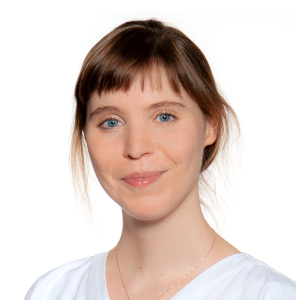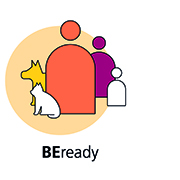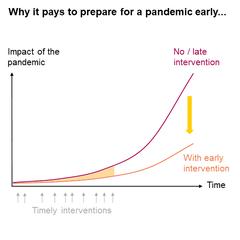Bern, get ready!
The next pandemic could start tomorrow and we don’t know which pathogen will cause it. Epidemic preparedness programmes were planned and discussed in most high-income countries after the 2009 H1N1 influenza pandemic, but many plans were never implemented. The experience from the first months of the coronavirus disease 2019 (COVID-19) pandemic showed how unprepared we actually were1.
A platform that can adapt rapidly to launch studies about newly emerging infections
This article introduces the BEready (short for “Bern, get ready”) cohort, one of three MCID core activities, the team and its progress in 2023. The aims of BEready are:
- to understand how the population of the canton of Bern has been and will be affected by COVID-19
- to understand the epidemiology and transmission of pathogens, particularly respiratory viruses
- to establish and maintain a platform for the investigation of infectious diseases
Prof. Dr. med. Nicola Low

Prof. Dr. med. Nicola Low (Lead, BEready)
“Research studies take a long time to set up from scratch. When the next pandemic starts, BEready and its study participants will be in place to start work quickly on the emerging pathogen.“
We plan to initiate research studies on infectious diseases and how they affect people in the canton of Bern. BEready will be a household cohort study, meaning that we will collect data from adults, children and pets in the same households over a long period of time. We are a multidisciplinary team of researchers with expertise in clinical epidemiology, infectious diseases, veterinary medicine, and community engagement.
Prof. Dr. med. Gilles Wandeler

Prof. Dr. med. Gilles Wandeler (Co-Lead, BEready)
“Our results have the potential to be generalizable to the population of Switzerland because the demographic characteristics of the Canton of Bern are very similar to those nation-wide.”
By 2024, BEready plans to enrol approximately 1,500 households into a population-based cohort. Participants will be characterised according to demographic, socio-economic, behavioural and health-related factors and through collection of biological samples for phenotypic and genotypic studies, with ongoing surveillance for circulating infections. This research platform will use innovative decentralised data collection methods, a flexible and novel bioinformatics infrastructure, and a biobank including human and pet samples. BEready provides a unique opportunity to collect data on transmission patterns of circulating infectious diseases both between individuals and at the human-animal interface (the concept known as ‘One Health’).
Prof. Dr. med. vet. Simone Schuller

Prof. Dr. med. vet. Simone Schuller (BEready Study Veterinarian)
“Including pets in the BEready cohort as part of a ‘One Health’ approach is crucial in investigating household transmission of infectious diseases.”
From the people of Bern, for the people of Bern
One of the challenges for BEready is to involve the population in preparing for a future pandemic. This challenge is well known in the field of preventive public health: convincing people to take measures to prevent something that has not happened yet, and from which they might feel no benefit. After all, the success of prevention only becomes apparent in the future, when the effects of the pandemic are not as severe as they would have been without action (Figure 1).
Community engagement is a crucial aspect of BEready. Within BEready, community members will co-develop meaningful and relevant research questions, promote the cohort study in their personal networks and relevant communities, and contribute to the enrolment of households, collection of data, and to making sense of the findings. We will jointly develop recommendations for action at community and policy level. Together with the Franxini Innovation Hub (a participatory support programme of the think tank Reatch), we are currently exploring how we can effectively communicate with people and policy makers to inspire them to support and participate in research that will improve preparedness and responses to future pandemics.
Prof. Dr. phil. Annika Frahsa

Prof. Dr. phil. Annika Frahsa (BEready Community Engagement Lead)
“BEready is a real-life participatory endeavour. We want to sensitise the population to the concept of preparing for and researching future pandemics, and to get them actively involved.”
Would you be willing to provide blood samples and nasal swabs for research purposes?
In autumn 2022, we conducted an online survey among 15,000 adults in the canton of Bern about their views, attitudes, beliefs, concerns and expectations about their potential participation in a research study about infectious disease. People were given a brief description of BEready and were asked if they would be willing to be a member of a cohort like BEready.
Among the 3,425 people who responded to the survey, 1,667 (49%) said that they would be willing to participate in BEready. The main motivation was the ability to contribute to the health of people around them, followed by the ability to contribute to better preparedness for the next pandemic, and interest in health and research.
Dr. phil. Eva Maria Hodel

Dr. phil. Eva Maria Hodel (Project Manager, BEready)
“We have been impressed by the altruism of people in the canton of Bern. Many are willing to do their part if it helps those around them.”
In May 2023, we will start our pilot study to establish the feasibility and logistics of a decentralised cohort with online self-administered questionnaires, self-sampling and telemedicine consultations. The data collected in a small set of 100 households over 12 months will provide invaluable information for the implementation of the full cohort.
Dr. med. Karin Grimm

Dr. med. Karin Grimm (BEready Study Physician)
“During the one year pilot study, we will investigate which respiratory viruses are circulating in households in Bern during disease events.”
BEready as an MCID core activity
BEready can be used to investigate transmission patterns as well as the direct and indirect impact of the pandemic on the population’s health, e.g. prevalence, immunity, and vaccine effectiveness and the social, economic and policy aspects of a pandemic. As a core activity of the MCID, we are keen to collaborate with researchers from the MCID, the University of Bern, the Inselspital and other research organisations. We are actively engaging with other cohorts nationally and internationally.
Selina Wegmüller

Selina Wegmüller (BEready Junior Project Manager)
“A key strength of this research platform is its ability to host nested studies on emerging infectious diseases.”
MCID members are already collaborating with the BEready cohort. Their projects cover ethics and policy, neglected zoonotic flavivirus infection, models to monitor epidemics in near real-time, personalised disease management in menopausal women, and political polarisation during pandemics.
We are looking forward to more researchers getting in touch to discuss future collaborations.
Article by: Dr. phil. Eva Maria Hodel (Manager, MCID BEready Cohort / Institute of Social and Preventive Medicine) on behalf of the BEready Cohort Team.
Published in:
Reference
1 The Independent Panel for Pandemic Preparedness & Response. COVID-19: make it the last pandemic. (2021) Link


